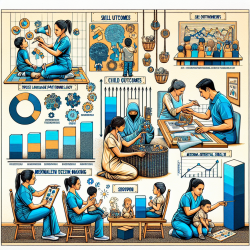In the field of speech-language pathology, data-driven decisions are crucial for achieving the best outcomes for children. A recent study titled "Evaluating ‘enhancing pragmatic language skills for young children with social communication impairments’ (E-PLAYS): protocol for a feasibility randomised controlled trial study" offers promising insights into improving pragmatic language skills in children with social communication impairments. This blog will explore the key findings of the study and how practitioners can implement these outcomes to enhance their practice.
The E-PLAYS Intervention
The E-PLAYS intervention utilizes a computer game designed to support children aged 4-7 with social communication impairments. This innovative approach aims to develop collaborative and communication skills through structured, interactive gameplay. The study's preliminary results indicate that children who participated in E-PLAYS showed significant improvements in communication test scores and collaborative behaviors.
Key Findings
- Children who received the E-PLAYS intervention demonstrated increased use of high-quality questioning and listening skills.
- Positive ratings about collaborative work with peers were significantly higher among children who participated in the intervention.
- The intervention was found to be acceptable to both children and practitioners, indicating its potential for broader implementation.
Implementing E-PLAYS in Practice
For practitioners looking to implement E-PLAYS, the study provides several actionable insights:
- Training: Speech and language therapists (SLTs) should undergo brief training to familiarize themselves with the E-PLAYS game and manual. This will enable them to train teaching assistants effectively.
- Collaboration: Partnering children with typically developing peers can enhance the intervention's effectiveness. Teachers and teaching assistants should select peer partners who are popular, prosocial, and self-confident.
- Fidelity: Ensuring that the intervention is delivered as intended is crucial. Regular monitoring and feedback can help maintain the integrity of the program.
Encouraging Further Research
While the initial findings are promising, further research is needed to validate the long-term effectiveness of E-PLAYS. Practitioners are encouraged to contribute to ongoing studies and share their experiences to help refine and improve the intervention.
To read the original research paper, please follow this link: Evaluating ‘enhancing pragmatic language skills for young children with social communication impairments’ (E-PLAYS): protocol for a feasibility randomised controlled trial study.










